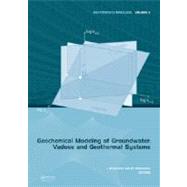- ISBN: 9780415668101 | 0415668107
- Cover: Hardcover
- Copyright: 12/27/2011
Geochemical modeling is an important tool for prognosis in both environmental studies and many tasks of subsurface and surface hydrology, mining geology, geothermics, hydrocarbon geology and the related engineering areas dealing with exploration and exploitation of natural resources. The modeling considers chemical and physical processes involving natural or anthropogenically produced chemical species within fluid liquid and gas phases, and interactions between these phases and solids (chemical reactions, sorption, ion exchange, decay, isotope fractionation etc.), which all may depend on temperature, pressure, ionic strength, etc. This book compiles and synthesizes the state-of-the-art of the principal fields of (hydro)geochemical modeling of low- and high-temperature subsurface systems such as groundwater, petroleum and geothermal systems and presents new and stimulating ideas of possible applications. It starts with an introduction to the basic principles of aqueous geochemistry and thermodynamics, it describes the construction of a conceptual hydrogeochemical model and defines the processes and model parameters relevant for individual field scenarios and modeling tasks. Then it discusses how a conceptual model is implemented into a mathematical/numerical model, and what field data and databases should be used. Limitations and problems of existing thermodynamic databases are discussed. The principle types of geochemical models (speciation, reaction-path or forward, inverse- and reactive-transport models) are described together with examples of the most common codes. Special emphasis is placed on case studies in different scientific areas and environmental settings, which focus on the practical aspects of modelling.






